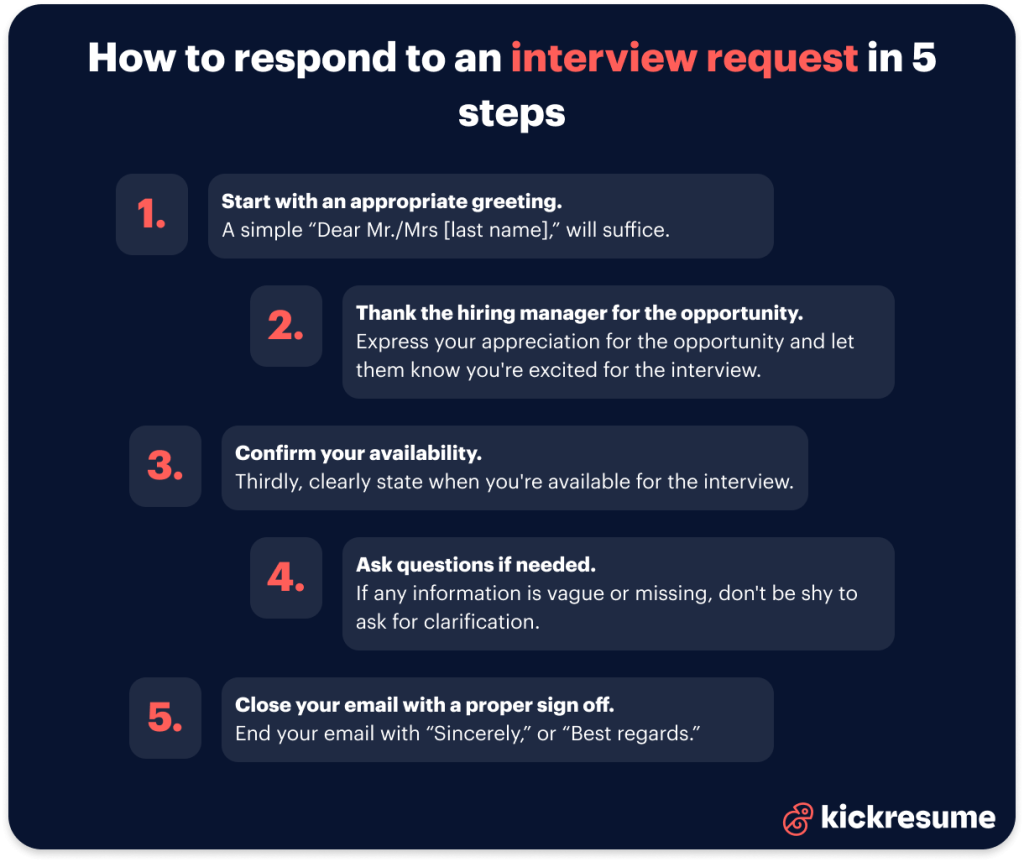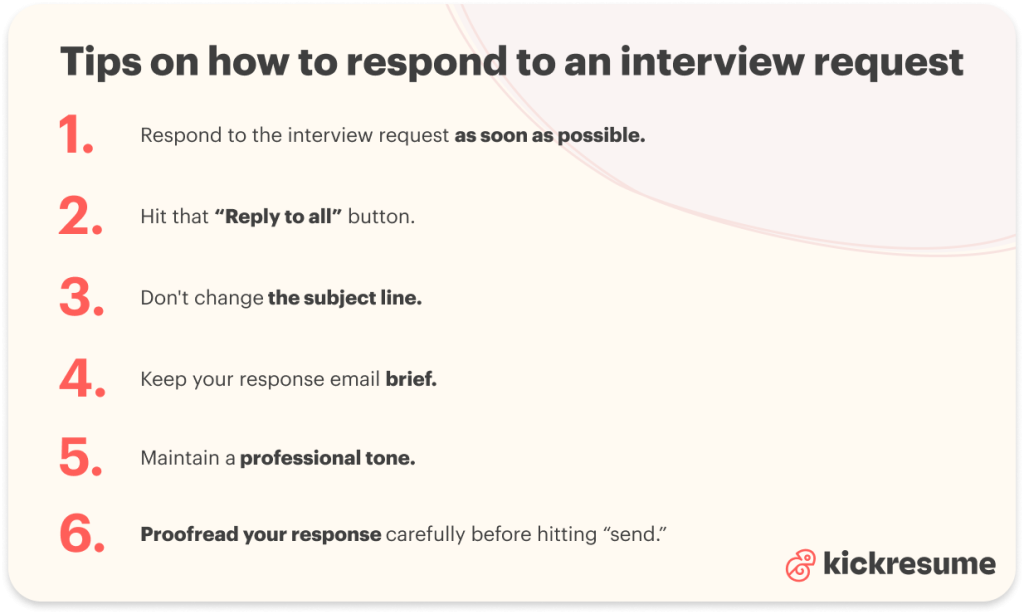Knowing how to respond to an interview request professionally is a skill essential to all job seekers!
First of all, congratulations! Receiving an interview invitation is a big deal — it's a clear sign that your resume and cover letter have caught the eye of the hiring team.
Still, what you do next is just as crucial, as your response sets the tone for the entire interview process. No pressure, right?
But don't worry, we'll show you exactly how to craft the perfect reply that covers all the essential details.
So, keep reading and find out:
- What is an interview request;
- How to respond to a request for an interview;
- 3 sample answers with commentary;
- And our tips on perfecting your email response.
What is an interview request
Let's start with the most obvious question – What is an interview request?
In short, it's a communication from a potential employer inviting you to participate in the interview process for that job position you've been trying to get for so long.
Receiving one means that the hiring manager has reviewed your job application and wants to learn more about you and your fit for the role.
Interview requests can reach you through several different channels: phone calls, LinkedIn messages, or job portals. But, you're most likely to receive yours in the form of an email.
What does an interview request consist of
It's impossible to figure out how to respond to an interview request email without knowing what to expect from it.
Of course, each and every interview request you receive is going to be different, but the key components will likely stay the same:
- "We've received your application" part. More likely than not, the email will begin by a brief mention that the employer has received and reviewed your application.
- The actual invitation. Of course!
- Job interview details. Also, you can expect to receive information such as the interview format, proposed date and time, location, and the names or roles of the interviewers.
- Further instructions. Finally, you may be asked to confirm the interview, prepare any documents you'll need to bring, and contact the employer if you have any questions.
Nothing less, and probably nothing more!
How to respond to an interview request in 5 steps
We've already covered the basics, so now it's time to look at how to respond to a request for an interview step by step.
While there isn't just one way to respond to an interview request, following these 5 steps keeps your reply clear and concise:
- Start with an appropriate greeting.
The first element that shouldn't be missing from your email is a polite greeting. Since you're responding to a previous email, addressing your response to a specific person shouldn’t be a problem at this point. A simple “Dear Mr./Mrs [last name],” will do.
- Thank the hiring manager for the opportunity.
Secondly, make sure to express your appreciation for the opportunity and let them know you're excited for the interview.
- Confirm your availability.
Thirdly, clearly state when you're available for the interview. If you’re offered several time-slots to choose from, pick the one that suits you the most. And if you can't make it, offer the hiring manager 3-4 alternatives.
- Ask questions if needed.
If any information is vague or missing, don't be shy to ask for clarification. You can ask about pretty much anything from the hiring process and schedule to where to park.
- Close your email with a proper sign off.
Lastly, you can reiterate your enthusiasm and gratitude for the invitation. Also, don't forget the obligatory “Sincerely,” or “Best regards,” followed by your name, email address, and phone number.
And there you have it, our ultimate foolproof guide to penning a response that showcases your best professional self.
See? We promised it won't be that difficult!

How to respond to an interview request? 4 Example replies
So far, we've been speaking strictly about theory. But now, let's look at concrete examples in action!
Below, you'll find 4 how to respond to an interview request email samples that deal with different situations you might find yourself in.
The best thing is, you can simply copy/paste and adjust them according to your needs. Or they can at least nudge you in the right direction.
Sample #1: Interview request response confirming an interview
In the best-case scenario, all the stars align, and you can confirm your availability without any hesitation. If that's your case, keep your response short and sweet like so:
#1 Interview request response example
Sample #2: Interview request response asking to reschedule
Of course, there's a chance that things won't always go as smoothly. If the date chosen by the hiring manager overlaps with your other commitments that can't be moved to a different date, you'll have to try to reschedule.
And in that scenario, politeness and directness are key.
But don't just say you won't be able to attend the interview without offering alternative dates (3-4 ideally). Otherwise you can give the impression that you have no interest in the position.
For example, your apology response could be phrased as follows:
#2 Interview request response example
Sample #3: Interview request response when you're asked to call
Or, you might find yourself in a situation where the interview request asks you to call the hiring manager directly to discuss interview details.
Although this scenario is becoming increasingly rare, some hiring managers may prefer to communicate with job candidates more personally. So, don’t be taken aback if your interview request instructs you to get in touch with the company via a phone call.
After all, it can save you both some time instead of an electronic back-and-forth!
Here is an example of how to reply to a phone call request:
#3 Interview request response example
Sample #4: Interview request response when you're asked to propose dates
Alternatively, you may end up in a situation where you'll be asked to propose interview dates that best fit your schedule.
Once again, remember to always provide multiple alternatives. Even if the interview request only asks for one. Because, by providing multiple dates, you communicate your flexibility as well as your consideration for the hiring manager's time.
A good example of a courteous response can look like this:
#4 Interview request response example
Additional tips on how to respond to an interview request
Right, we've seen what an appropriate response to an interview request can look like. But are there any tips that can elevate your communication with the hiring manager?
Indeed there are!
No matter the context of your response, you should always follow these 6 simple tips:
- Respond to the interview request as soon as possible. Because nothing speaks more clearly of your eagerness and enthusiasm for the job than a prompt response. Ideally, the hiring manager will hear back from you within 12-24 hours.
- Hit that “Reply to all” button. Sometimes the person you're communicating with and the one who will eventually conduct your interview might not be the same. So, make sure you won't exclude anyone from the email thread!
- Don't change the subject line. Instead of sending out a new email altogether, continue with the original communication thread. This might seem like obvious advice, but you'd be surprised how many people don't follow it. Retaining the original subject line makes the conversation easy-to-follow.
- Keep your response email brief. There's no need for long-winding paragraphs expressing your endless gratitude, trust us. Instead, keep your response concise and to-the-point.
- Maintain a professional tone. Yes, finally getting your hands on that interview invitation may be euphoric. So much so that you may feel the need to share your enthusiasm with the hiring manager. But remember that this is professional communication, and the tone of your response should reflect that.
- Proofread your response carefully before hitting “send.” Finally, don't underestimate the power of careful proofreading. It's the best way to avoid unnecessary mistakes like typos or grammar errors. First impressions count, so don't let the misspellings ruin yours!

Get ready for the job interview
Let's be honest, job interviews can rattle even the most confident people. And no wonder! Putting yourself in situations where you're being judged and evaluated can cause a fair amount of stress.
Although there's no miracle fix-all, taking the right steps can ease some of the discomfort and calm your nerves:
- Research the company before entering the room. Companies want to see that you're interested in them and their role. So, go through the company website, LinedIn profile, social media accounts — anything that can give you an understanding of the employer's goals, values, successes, and struggles.
- Be ready to answer questions about your resume. Of course, your resume should only include information that is true. So don't get surprised if you're asked to elaborate on some of your points.
- Prepare your answers for the most common interview questions. Surely, you can't predict for certain what questions you'll be asked. But questions like “What are your salary expectations," “Why should we hire you,” or “Why are you interested in this position” are tried-and-tested job interview staples.
- Dress to impress. Also, make sure your outward appearance shows that you're a well-put-together and representative individual. Professionalism can be conveyed in several ways, and your apparel is certainly one of them.
- Master your body language. No slouching, fidgeting, or leg bouncing! Instead, show off your confidence and composure.
- Be ready to ask questions yourself. Finally, prepare a question or two you can ask at the end of your job interview. Recruiters love to see your proactive approach and genuine interest.
Key takeaways: How to respond to an interview request
To sum it all up, an interview request is an invitation from a potential employer to participate in the interview process for a job you applied for.
Knowing how to respond to a request for an interview is essential for making a great first impression and setting the tone for the entire interview process.
To make your response impactful and informative, don't omit any of the following steps:
- Start with an appropriate greeting. Since you're responding to a previous email, addressing your response to a specific person shouldn’t be a problem at this point.
- Thank the hiring manager for the opportunity. Secondly, make sure to express your appreciation for the opportunity and let them know you're excited for the interview.
- Confirm your availability. Thirdly, clearly state when you're available for the interview.
- Ask questions if needed. If any information is vague or missing, ask for further clarification.
- Close your email with a proper sign off. Finish your email with “Sincerely,” or “Best regards,” followed by your name, email address, and phone number.



